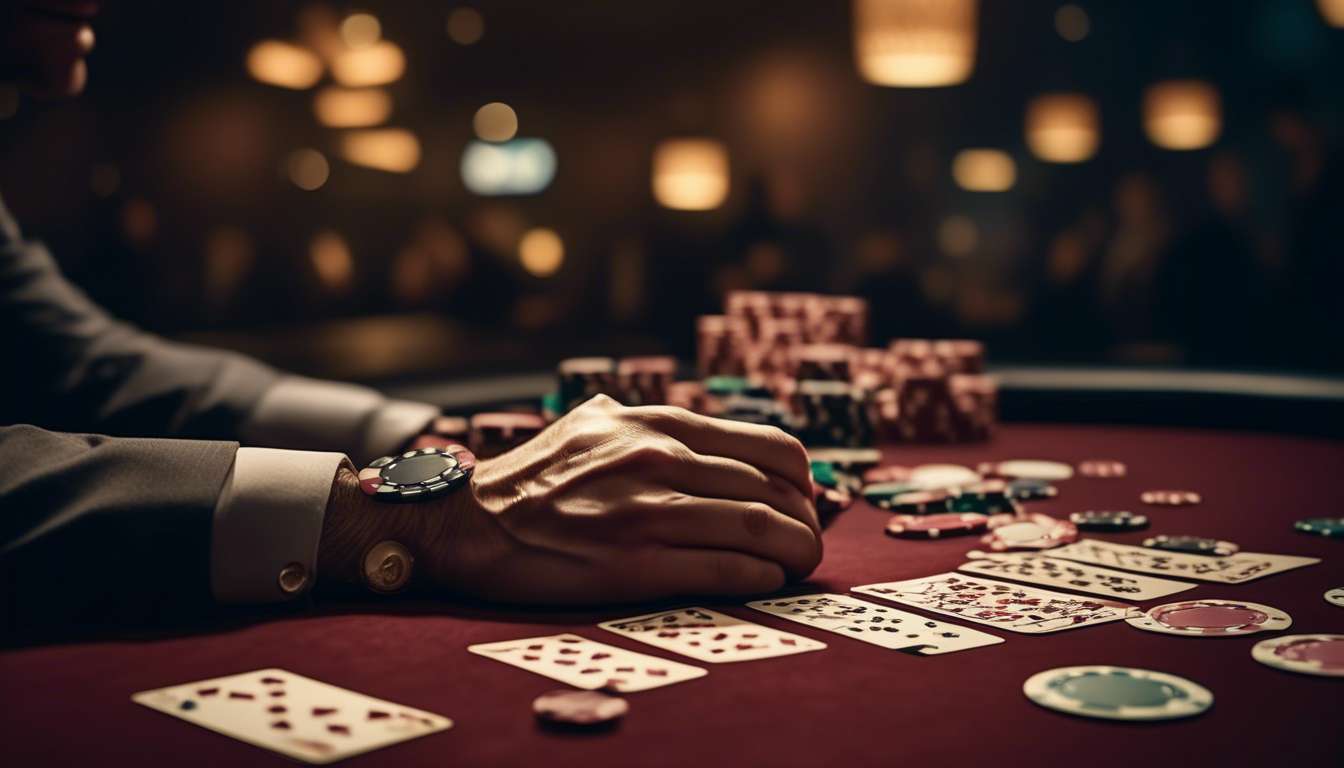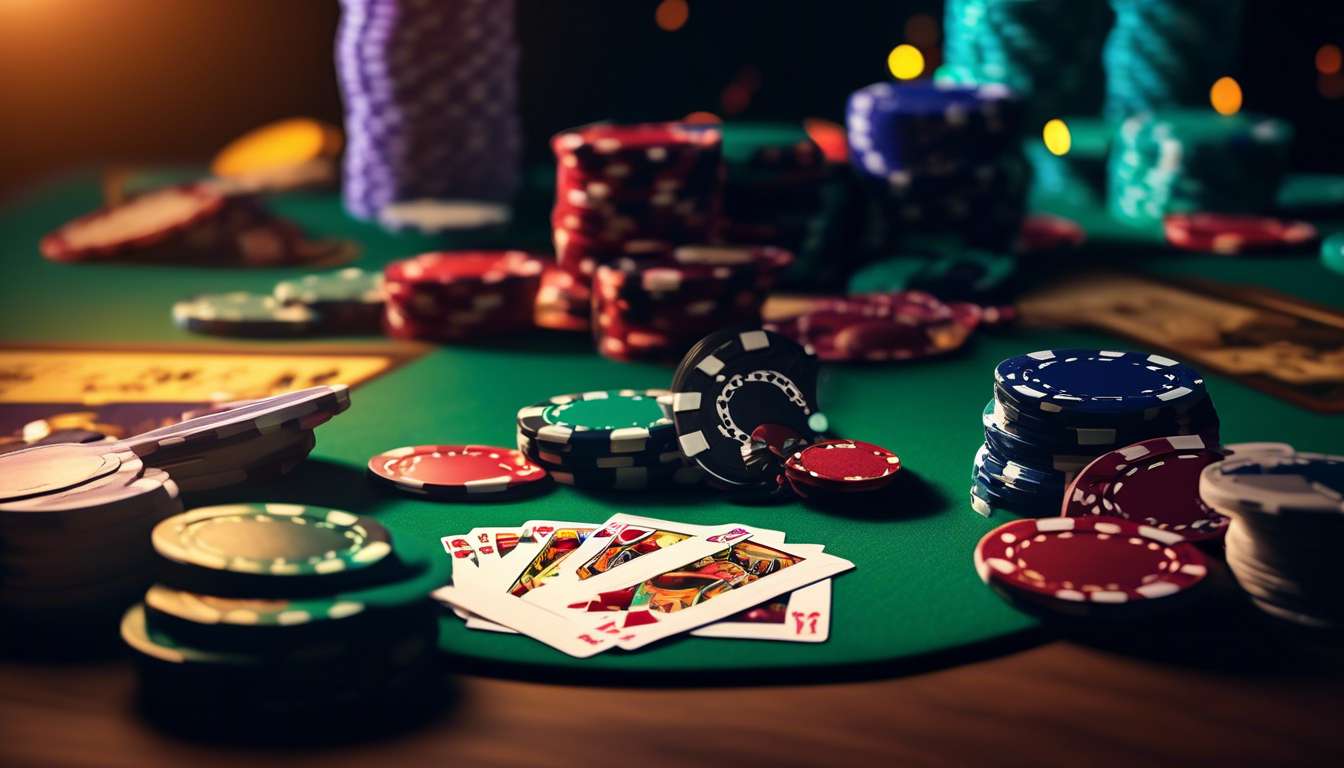As passionate enthusiasts of the game of poker, we often find ourselves captivated by the extraordinary successes of certain players at the table. What is it that sets these individuals apart, allowing them to consistently outwit their opponents and rake in substantial winnings?
In our quest to unravel this mystery, we delve into the intricate blend of skills, strategies, and psychological acumen that elevate some players above the rest.
Key elements of poker mastery include:
- A deep understanding of probability.
- The ability to read opponents effectively.
- The art of bluffing.
Moreover, we consider the mental resilience and adaptability required to navigate the ever-changing dynamics of the game.
By examining the habits and mindsets of top players, we aim to uncover the secrets behind their success and perhaps glean insights that could enhance our own game.
Join us as we explore the fascinating world of poker mastery.
Mastering Probability
Understanding probability is crucial for making informed decisions and increasing our chances of winning in poker. It helps us decide when to call, fold, or raise, providing a solid foundation for our strategies.
The Art of Bluffing:
- Requires a keen understanding of probability.
- Involves calculating the odds of opponents having stronger hands.
- Allows us to confidently decide when to bluff, increasing the likelihood of opponents folding so we can scoop up the pot.
Adaptability in Poker:
- Poker is a dynamic game, not static.
- Success requires adjusting strategies based on the ever-changing probabilities of winning.
- Mastering probability equips us to adapt and thrive, helping us find our place among the poker elite.
By grasping these concepts, we can belong to the group of successful players who consistently come out on top.
Reading Opponents Efficiently
Efficiently reading opponents is a vital skill that lets us anticipate their moves and adjust our strategy accordingly. By observing players at the table, we can gauge their tendencies and predict their actions.
Understanding probability helps us determine the likelihood of their hands and whether they’re attempting to bluff. This knowledge allows us to make informed decisions and stay one step ahead in the game.
Our adaptability is crucial when reading opponents. Each player has unique habits and tactics, so we must adjust our approach based on the signals they send.
- Are they displaying signs of confidence or hesitation?
- Recognizing these cues can reveal their intentions.
By staying alert and flexible, we create a sense of unity with fellow players, building an intuitive understanding of their behaviors.
In our poker community, sharing insights and experiences strengthens our collective ability to read opponents. Together, we refine our skills, support each other’s growth, and foster a sense of belonging at the table.
Perfecting the Art of Bluffing
Mastering the art of bluffing requires us to skillfully manipulate perceptions, making opponents question the strength of our hands. In our poker community, bluffing isn’t just about deception; it’s an intricate dance of probability and psychology.
Key Elements of Bluffing:
-
Assessing the Odds:
- Evaluate the likelihood of your opponents having strong hands.
- Calculate the probabilities to determine if bluffing is a viable strategy.
-
Adaptability:
- Shift strategies as the game unfolds.
- Stay flexible to respond to new information and player behaviors.
The Thrill of a Successful Bluff:
We all know the thrill when a perfectly executed bluff makes our opponent fold a stronger hand. It’s a skill that binds us together, a shared understanding of the game’s nuances.
Subtle Communication:
- Use gestures and strategic pauses to create a narrative.
- Craft an illusion that lures others into your strategy.
Understanding Fellow Players:
Success in bluffing also means understanding our fellow players and predicting their responses. Together, we cultivate an environment where every hand offers a new opportunity to outwit and outmaneuver.
Strengthening Bonds:
- The shared pursuit of mastery in bluffing strengthens our bond.
- Each hand is a new challenge to enhance our skills and understanding of the game.
Developing Mental Resilience
Developing Mental Resilience
In our pursuit of becoming successful poker players, we must develop mental resilience to navigate the highs and lows of the game with composure and strategic focus. It’s essential to learn to accept the unpredictability of probability, understanding that even the best strategies sometimes don’t yield the desired outcome.
Embracing this reality allows us to remain calm and confident, knowing that our skills will guide us through the variance.
Community Support and Shared Experiences
As a community, we find strength in shared experiences, supporting each other in overcoming emotional setbacks. Bluffing, while a crucial skill, can be mentally taxing. It requires us to maintain a poker face and project confidence even when the odds aren’t in our favor.
This is where our mental resilience shines, enabling us to manage stress and regroup quickly.
Adaptability and Focus
Together, our adaptability in handling unexpected situations and our ability to stay focused amid distractions build the foundation of our collective success at the poker table.
Embracing Adaptability in Gameplay
In poker, we must swiftly adjust our strategies to the ever-changing dynamics of the game. Understanding the role of probability enhances our decision-making, allowing us to adapt when the odds shift.
We might find ourselves facing a skilled opponent who’s bluffing, and in these moments, our adaptability becomes crucial. By embracing flexibility, we can alter our approach, ensuring we’re not predictable and maintaining our edge.
We’re united by the thrill of reading the table and anticipating our opponents’ moves. Adaptability is the glue that binds us, enabling us to seamlessly transition from cautious play to aggressive tactics. This shared skill set helps us thrive in unpredictable situations.
When we approach each hand, we aren’t just playing cards; we’re engaging in a dynamic dance of strategy and intuition. By valuing adaptability, we foster a sense of belonging in our poker circles, where each of us contributes to the ever-evolving tapestry of the game.
Learning from Top Players’ Habits
Many top poker players have honed specific habits that we can learn from to enhance our own game. By embracing these habits, we become part of a community where success is a shared goal.
Understanding and Calculating Probability
Understanding and calculating probability is crucial. It helps us make informed decisions, increasing our chances of success. We should practice calculating odds quickly, just like the pros do, to stay ahead.
The Art of Bluffing
Bluffing is not just about deception; it’s an art that top players master. Practicing bluffing with confidence allows us to control the table’s dynamics and keep opponents guessing.
To improve our bluffing skills, we can:
- Study how seasoned players time their bluffs.
- Apply those techniques to our game.
Adaptability
Adaptability is key. Top players thrive because they adjust their strategies based on opponents and situations.
To become more adaptable, we should:
- Strive to be flexible.
- Learn to shift gears when needed.
- Ensure we’re always in the best possible position to win.
By adopting these habits, together, we can reach new heights in our poker journey.
Understanding Psychological Strategies
To master poker, we must delve into the psychological strategies that influence both our decisions and those of our opponents.
Understanding Probability
Understanding probability is key. It allows us to make informed decisions based on the likelihood of various outcomes. This fosters a sense of belonging among skilled players who share a common language of odds and calculations.
Bluffing as a Strategy
Bluffing is another essential strategy. It’s about more than just deception; it’s a dance of:
- Reading our opponents
- Knowing when to project strength or vulnerability
Successfully bluffing creates a bond of respect among players, as it demonstrates a deep understanding of the game’s psychological nuances.
Adaptability in Poker
Adaptability is equally crucial. The ability to adjust our strategies in response to:
- Changing circumstances
- The play style of our opponents
This ensures we remain unpredictable and competitive. Embracing adaptability helps us feel connected to the evolving dynamics of the game, as we continuously learn and grow alongside our peers.
Enhancing Your Own Gameplay
To enhance our gameplay, we must focus on refining our skills through consistent practice and deliberate analysis of our performance. By doing so, we not only sharpen our understanding of probability but also nurture a sense of camaraderie as we share insights and strategies with fellow players.
Embracing adaptability is crucial. Each hand dealt offers a unique puzzle, and our ability to adjust our tactics keeps us competitive and connected to the ever-evolving dynamics of the game.
Bluffing is an art form we must master together. It’s not just about deceiving opponents but also about reading the table and understanding when to seize the moment. This shared experience of knowing when to hold or fold binds us as a community of strategic thinkers.
Let’s relish the thrill of each hand, knowing that our growth as players is intertwined. We learn, adapt, and thrive, not just as individuals, but as a collective, united by our love for the game.
What are the most common mistakes new poker players make and how can they be avoided?
When we start playing poker, we often make common mistakes that can hurt our game.
One of the biggest errors is playing too many hands, which can lead to losses.
Another pitfall is not paying attention to our opponents’ betting patterns, missing valuable information.
To avoid these mistakes, we need to:
- Practice discipline
- Focus on hand selection
- Study our opponents closely
By doing so, we can improve our poker skills and avoid costly errors.
How does physical fitness impact a poker player’s performance and success at the table?
Staying physically fit can significantly impact our performance at the poker table. Exercise helps us stay sharp mentally, improving focus and decision-making.
It also boosts our stamina, allowing us to endure long games without getting fatigued. By taking care of our bodies, we set ourselves up for success in poker by maintaining peak cognitive function and resilience during intense sessions.
Prioritizing physical fitness can give us a competitive edge in the game.
What role does technology play in improving a poker player’s skills and strategies?
Technology greatly enhances our poker skills and strategies.
We use software tools to:
- Analyze data
- Track opponents’ tendencies
- Improve decision-making
Apps and online platforms offer training resources that help us:
- Learn new techniques
- Stay ahead of the game
Embracing technology gives us a competitive edge and allows us to adapt to the ever-evolving landscape of poker. It’s a crucial element in our quest for mastery at the table.
Conclusion
To become a successful poker player, focus on mastering the following key elements:
-
Probability
Understand the mathematical aspects of poker, including odds and probabilities, to make informed decisions during the game. -
Reading Opponents Efficiently
Develop the skill to interpret opponents’ actions and body language to anticipate their moves. -
Perfecting the Art of Bluffing
Learn when and how to bluff effectively to gain an advantage over your opponents. -
Developing Mental Resilience
Cultivate the ability to stay calm and focused, regardless of the game’s highs and lows. -
Embracing Adaptability
Stay flexible and adjust your strategies based on the dynamics of the game and the behavior of your opponents. -
Learning from Top Players’ Habits
Observe and incorporate successful habits and strategies from experienced poker players. -
Understanding Psychological Strategies
Use psychological tactics to influence and outmaneuver your opponents. -
Enhancing Your Own Gameplay
Continuously analyze and refine your gameplay to improve your skills and strategy.
By incorporating these elements into your approach, you can increase your chances of achieving success at the poker table.
Additional Tips:
- Keep practicing regularly to hone your skills.
- Stay sharp by studying new strategies and trends in the game.
- Remember that consistency and dedication are crucial to reaching your full potential in poker.
Embrace these principles, and you’ll be well on your way to becoming a successful poker player.




